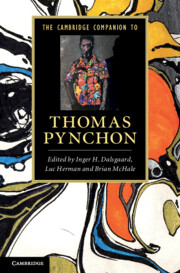6 - Pynchon in literary history
from PART II - POETICS
Published online by Cambridge University Press: 28 March 2012
Summary
Even relatively early in his career critics compared Pynchon to writers like Rabelais, Swift and Melville. Like Cervantes or Sterne or Joyce (who died only four years after Pynchon's birth), Pynchon takes naturally to grand, comedic visions of the culture that has shaped his imagination and sensibility. He has affinities with the great epic poets as well. His catalogues – of disasters, of trash in a used car, of stamp anomalies, of pre-war British candies – link him to Homer, to Spenser, to his countryman Walt Whitman. Like Milton, he can recount a creation story fraught with sexual politics (Eve, Lilith and Adam become, in Vineland [1990], Frenesi, DL and Brock Vond) or imagine history's omega (the descending Rocket in the closing pages of Gravity's Rainbow [1973]). In Mason & Dixon (1997), like Virgil chronicling the mythic genesis of the fatherland, Pynchon imagines the moment at which the disparate ingredients of the American nation first came together. Like Swift, Pynchon can imagine a flying island (the tumescent airship of the Chums of Chance in Against the Day [2006]). Like Dante, he can evoke hellish abjection (Brigadier Pudding) and even conduct readers on a tour of the infernal regions, as announced by an epigraph purporting to come from the doubly apocryphal Gospel of Thomas (“Oxyrhynchus papyrus number classified”): “Dear Mom, I put a couple of people in hell today.”
- Type
- Chapter
- Information
- The Cambridge Companion to Thomas Pynchon , pp. 81 - 96Publisher: Cambridge University PressPrint publication year: 2011
- 1
- Cited by

